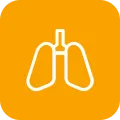YOUR COPD COULD BE A GENETIC CONDITION CALLED ALPHA-1.
While there is no cure for alpha-1, it is important to know that there are FDA-approved treatment options for some people living with alpha-1.*1-4 The first step is to find out your risk.
How alpha-1 affects your body
Most people don’t even know they have alpha-1.
Because the symptoms of alpha-1 are the same as traditional COPD symptoms, it can go undetected for years. In fact, more than 90% of the estimated 100,000 people in the United States who have alpha-1 don't know they have it.7-8
Dan's story
Dan served in the United States military for 14 years. One day, Kathy, his wife, found him outside gasping for breath. At that point, they knew something was wrong. Fortunately, Dan was diagnosed with alpha-1 shortly thereafter before his 60th birthday.
Knowing could change your fight. FDA-approved treatment options may exist.
According to the COPD Foundation and other leading health organizations, if you have been diagnosed with COPD, you should get screened for alpha-1.1-4 If your healthcare provider determines that your COPD is genetic and diagnoses you with alpha-1, they can create a treatment plan that’s right for you. And just like with people who have non-genetic COPD, there may be lifestyle changes you can make to improve your symptoms.
Learn your risk for alpha-1 with the AlphaID™ At Home Genetic Health Risk Service.
With AlphaID™ At Home, it’s free and easy to discover your risk for alpha-1 in the comfort and privacy of home.† The FDA-cleared AlphaID™ At Home Saliva Collection Kit has all the supplies you need to find out your risk with at least 99% accuracy.
Want to know more about genetic COPD screening?
Sign up to learn more about the free AlphaID At Home Service. We’ll show you how easily AlphaID At Home can help you learn your risk for genetic COPD.
*Talk to your healthcare provider about possible treatment options.
†The AlphaID At Home Genetic Health Risk Service, including the kit, is provided for free and may not be billed to patients or their insurers. There is no obligation to purchase or use any product or service offered by any manufacturer.
References
- American Thoracic Society; European Respiratory Society. American Thoracic Society/European Respiratory Society statement: standards for the diagnosis and management of individuals with alpha-1 antitrypsin deficiency. Am J Respir Crit Care Med. 2003 Oct 1;168(7):818-900.
- World Health Organization. Alpha 1-antitrypsin deficiency: memorandum from a WHO meeting. Bull World Health Org. 1997;75(5):397-415.
- Sandhaus RA, Turino G, Brantly ML, Campos M, Cross CE, Goodman K, Hogarth DK, Knight SL, Stocks JM, Stoller JK, Strange C, Teckman J. The Diagnosis and Management of Alpha-1 Antitrypsin Deficiency in the Adult. Chronic Obstr Pulm Dis. 2016 Jun 6;3(3):668-682.
- Global strategy for the diagnosis, management, and prevention of Chronic Obstructive Pulmonary Disease. GOLD COPD 2021 report.
- What is COPD? COPD Foundation website. https://www.COPDfoundation.org/What-is-COPD/Understanding-COPD/What-is-COPD.aspx. Accessed November 3, 2023.
- de Serres F, Blanco I. Role of alpha-1 antitrypsin in human health and disease. J Intern Med. 2014 Oct;276(4):311-35.
- Campos MA, Wanner A, Zhang G, Sandhaus RA. Trends in the diagnosis of symptomatic patients with alpha1-antitrypsin deficiency between 1968 and 2003. Chest. 2005 Sep;128(3):1179-86.
- Chorostowska-Wynimko J. Targeted screening programmes in COPD: how to identify individuals with α1-antitrypsin deficiency. Eur Respir Rev. 2015 Mar;24(135):40-5.





